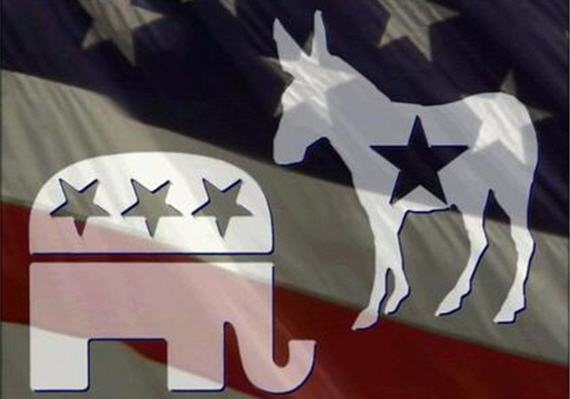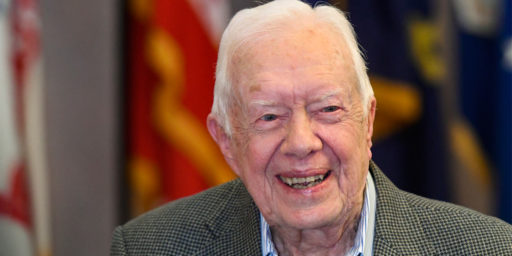Like it or Not: IA+NH=Important
Since the adoption of the current rules for delegate allocations only twice has either party nominated someone who did not win either IA or NH.
 As a follow-up to my post about the zombification of the Perry, Santorum, and Gingrich campaigns, comes the question of whether, historically, the eventual nominees ever managed to ride a post-IA/NH strategy to the coronation of their party.
As a follow-up to my post about the zombification of the Perry, Santorum, and Gingrich campaigns, comes the question of whether, historically, the eventual nominees ever managed to ride a post-IA/NH strategy to the coronation of their party.
The answer is: since the beginning of the current rules for delegate allocations (1972) only twice has either party nominated someone who did not win either IA or NH. In the 1972 cycle the nominee was Senator George McGovern, but Senator Edmund Muskie came in second in Iowa (“uncommitted” came in first) and he won New Hampshire. In 1992 the eventual nominee was Bill Clinton, but Tom Harkin won Iowa and Paul Tsongas won New Hampshire. Every other nominee of both parties since 1972 has won either IA or NH. That is 18 of 20 nominees.
I would note, however, that no nominee of either party since 1972 has failed to at least come in second one of the two contests (McGovern was second in NH, as was Clinton). That is to say: the winner has always been competitive in either IA or NH. In other words: there is no example of an eventual nominees utterly failing in IA and NH (defined as third or worse in both) and then going on to success. Perry, Bachmann, and Gingrich all appear destined to achieve that level of failure in both contests. As such, focusing on SC is a longshot strategy.
It is worth noting that 1972 was the beginning of the current system of delegate allocation and therefore was before the current system was fully institutionalized (i.e., the beginning of the modern era of nomination process where the primaries selected convention delegates bounds to specific candidates). Further, the Iowa caucuses were not considered significant until after Jimmy Carter’s surprising second-place finish in 1976 (again, “uncommitted” came in first). As such, really only the Clinton example is useful for contemporary comparisons.
While Clinton failed to win either Iowa or New Hampshire, he was still competitive in New Hampshire, coming in second to New Englander Paul Tsongas. It is worth noting that Iowa Senator Tom Harkin won his home state with 76% of the vote in 1992. The fact that a popular Iowan ran in 1992 meant that the Iowa did not serve a narrowing function for the Democrats in that cycle.
Here’s the run-down of Iowa and New Hampshire from 1976 to 2008:
| Iowa | Dem Winner | Rep Winner |
| 2008 | Obama | Huckabee |
| 2004 | Kerry | Bush |
| 2000 | Gore | Bush |
| 1996 | Clinton | Dole |
| 1992 | Harkin | Bush |
| 1988 | Gephardt | Dole |
| 1984 | Mondale | Reagan |
| 1980 | Carter | Bush |
| 1976 | Uncommitted | Ford/Reagan |
| New Hampshire | Dem Winner | Rep Winner |
| 2008 | Clinton | McCain |
| 2004 | Kerry | Bush |
| 2000 | Gore | McCain |
| 1996 | Clinton | Buchanan |
| 1992 | Tsongas | Bush |
| 1988 | Dukakis | Bush |
| 1984 | Hart | Reagan |
| 1980 | Carter | Reagan |
| 1976 | Carter | Ford |
The bottom line, to back up my earlier point, is this: like it or not, candidates have to be competitive in Iowa and NH and, to date, no candidate has lost badly in both Iowa and New Hampshire and gone on to a successful run at their party’s nomination. Even the one case of a post-1972 nominee who failed to win one of the two contests, Bill Clinton in 1992, underscores the point: it was his second place win in New Hampshire (after winning 3% in IA) that allowed him to declare himself the “Comeback Kid.” Had he lost badly in NH along with a single-digit showing in IA his momentum would have been crushed. 1992 was an odd year as well in terms of political geography: Harkin was a sitting Senator in Iowa and Tsongas had been a Senator from Massachusetts, which gave him an advantage in New Hampshire.
The bottom line is this: the winners/competitive candidates in Iowa and New Hampshire are going to get a lot of press and will find it easier to raise money than will the losers/noncompetitive candidates. As such, the notion that single-digit showings in IA and NH can be overcome later in the process is problematic, and if achieved will be historical in nature.
Note, too: the non-political junkies are only just now starting to pay attention, just as the labels “winner” and “loser” are starting to be applied to candidates.
This is, by the way, one of the reasons I find Iowa and New Hampshire’s special status to be problematic: it gives them too much significance.






The flip side is that without IA+NH canidates like Santorum, Bachmann, and Perry, wouldn’t have had a chance to begin with.
Is that math correct? You chart 18 races; perhaps its 16 of 18 nominees?
I think there is a problem of extracting from small sample size. Six of these races, depending on how you count were essentially uncontested for the incumbent, perhaps 7 since I don’t believe Gore in ’00 was seriously challenged by Bradley. Thow a few oddball primaries in the mix, like “uncommitted” in ’76, Iowan Harkin in ’92, or perhaps throw out ’76 entirely as you imply. I think you would be done to about seven races, with Clinton being the exception.
@PD Shaw: I was counting the 1972-2008 in that sentence (10 races, hence 20 nominees). The table only has 1976-2008 (hence 9 races, 18 nominees).
From 76-08, it is1 out of 19.
And yes: there is a small N here, no doubt about it.
Still, it is a pretty powerful pattern and it isn’t one that is likely to be altered this year, but perhaps it will.
As I continually note: I don’t like this process, but the bottom line remains that the combination of media attention and fundraising capabilities are profoundly shaped by IA and NH.
Clinton still fits the basic pattern: he was able to use NH as a springboard. This is the basic point, yes–esp. vis-a-vis Perry, Bachmann, and Gingrich.
Where is the argument that one can tank IA and NH and go on to be nominated?
Correlation does not imply causation…
I think anything can happen in the Republican race this time around.
In other words: even if I concede that my argument is weak based on a small N (such is the bane of social science, often), the counter-argument is even weaker on account of zero evidence to support it, yes?
@ponce: More like past performance is not indicative of future outcomes…
At any rate:
Anything? Well, perhaps not. I don’t, for example, see the party failing to nominate a candidate (or deciding to call Gary Johnson with an apology during a brokered convention).
Despite the Not Romney rollercoaster, the bottom line remains that the contest is going to be between Romney (who enters today with a solid foundation upon which to build) and some Not Romney or two (all of whom have shifting, sand-like foundations).
The real question is: is there a Not Romney who actually has a chance to beat Romney? If so, who and how? At this point, I am honestly having a hard time seeing it.
Perry and Bachmann appear totally dead.
Gingrich appears to be dying (if not already dead).
Santorum is surging, but I can’t see it lasting.
Paul is fading after his surge (and he will get a boost going in NH with a top 3 finish), but I don’t see him as viable.
Huntsman is non-existent.
So, where is this “anything” going to come from?
@PD Shaw: I’m not sure where my math is coming from, I count ten contested races since ’76:
80: 1 (Carter incumbent)
84: 1 (Reagan incumbent)
88: 2 (though tempted to say Bush wasn’t seriously challenged, he was in IA by Dole)
92: 1 (Bush incumbent)
96: 1 (Clinton incumbent)
00: 1 (Gore “incumbent”)
04: 1 (Bush incumbent)
08: 2
I think that puts at ten races since ’76, only one of which involved a candidate that failed to win IA or NH.
In any event, I believe IA and NH have different enough demographics that a succesful candidate should be able to focus and win one of them, so I kind of agree with this post. Clinton got a reprieve because IA and NH were won by local candidates and were thus discounted. I think it would be in the interest of all of the non-Romneys to similarly discount NH. But the non-Romneys lack the funding/organization to bypass any chance of building momentum.
@PD Shaw: I was, somewhat lazily, including all contests, including years with incumbent presidents.
@PD Shaw:
But the great thing for the Not Romeny’s is that because Romney gets a New Englander’s score in NH the second place finisher (and maybe even third, depending on the numbers) can claim that even though the lost, they “won.”
It is a crazy system. Like I keep saying, I am no defending the process, but I can’t escape the fact that is matters and shapes public perceptions about winners and losers.
@PD Shaw:
Just for consistency’s sake, either Bush I was an incumbent, or Gore wasn’t.
Who do you think would win if Romney dropped out?
The problem with the multi-posts, it seems like most of my comments are made either by Steve or Doug in one of the other comment threads.
My main problems with the current system is the caucus part of Iowa, and the need to advance a couple more primaries in other regions in importance, like a representative from the West and the South, such as Nevada and [bellweather state of the South, perhaps TN]. That would result in four representative regional primaries.
@ponce:
This strikes me as rather substantially unlikely action.
And the best answer to that question is: Obama.
@PD Shaw: We agree that another system would be preferable.
@Ben: “Just for consistency’s sake, either Bush I was an incumbent, or Gore wasn’t.”
Good point. My thinking was that both Veeps had the tacit if not express endorsement of the lame duck President, but Bush I received a substantial challenge from Bob Dole, the Senate Leader and former VP nominee. Gore didn’t receive such a challenge from any national figure. I’d argue that only one of these was considered the “incumbent” by his parties for a variety of reasons.
Throw in another parameter like since the turn of the century and you can say the record has been 100%. 1 out of 8,9,10 depending on the parameter you are using is in the end a very small sample size. Trying to draw any firm conclusion from those numbers would be just wishful thinking.
That said, IMO those two contests are important. Not as much as some believe. However they are early indicators and do effect the MSM and fundraising.
It is the way things have been done in the pass but will most likely change someday. Will this be that year, I doubt it but I was surprise by some of the changes in the 2010 election cycle. Most process changes don’t happen overnight.
I’m late to the game, but here’s my thought on this topic, only slightly crystallized since I first read this post this morning:
Iowa and New Hampshire aren’t first because they’re important, they’re important because they’re first.
@Boyd:
Yup. And because the media treats them like they are really, really important.